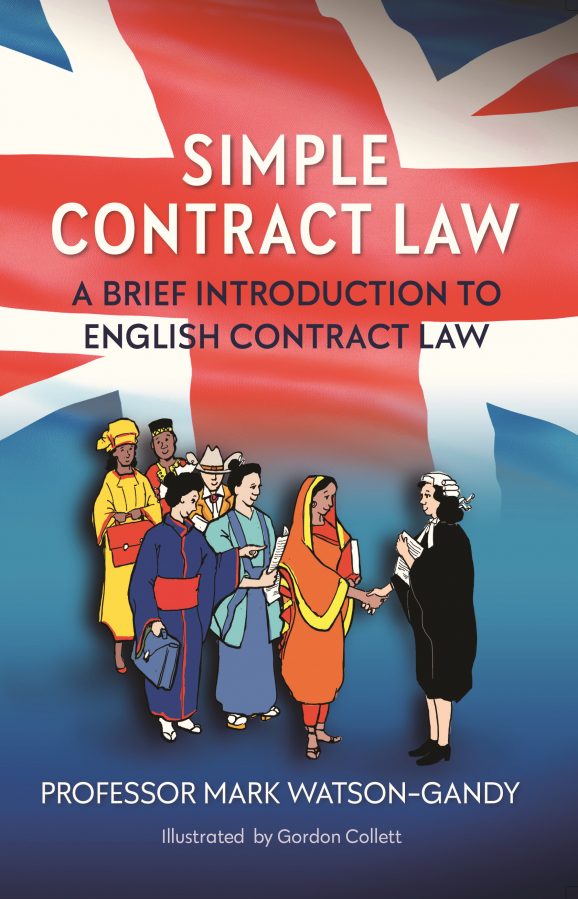Why English contract law?

John E. Kaye
- Published
- Executive Education, Home, Uncategorized


Businesses are increasingly choosing to interpret international contracts under English law – for good reason. By Professor Mark Watson-Gandy
Ever since man first traded a mammoth skin for a new spear, we have entered into contracts between each other.
These days, increasingly, international contracts choose to be interpreted under English law. English law has entrenched sector dominance in international commercial contracts, banking, and financing, maritime and shipping, mergers and acquisitions, dispute resolution and international arbitration.
There is a significant economic benefit attached to this, with UK legal services exports amounting to approximately £5 billion per annum. Some 70 percent of London’s Commercial Court work emanates from businesses outside the UK, and involves disputes that do not concern property or events in the UK, or disputes where the parties are based in this country.
No doubt, some of the attractiveness of the offering of the UK courts can be put down to the expert legal services available in London, the mutual recognition (and thus ease of enforcement) that English judgements enjoy in a large number of other countries, the comparatively speedy procedures available in UK courts, and the independence and expertise of our judiciary.
The quality of our judiciary is often underappreciated in the UK, where there is little experience of judges who are political appointees or, who, like on the continent, come to the bench fresh out of law school. Rather, the UK judiciary is selected from the cream of our lawyers, who come to the bench with the benefit of decades of experience under the belt, and has proved itself fiercely independent of government.
This does not, however, explain the preference of businessmen in other jurisdiction to choose English law to govern their contracts.
The reason is partly historic. Connections from the time of the British Empire resulted in English law enjoying a global reach that extended all the way from Australia and New Zealand to large parts of Africa, Asia and Canada, as well as a number of other Commonwealth nations. As a result, the legal systems of many of these countries are derived from, or maintain, a strong link to English common law principles. English law is well understood and embraced by these countries, and continues to be highly regarded and followed (in various degrees) to this day.
Consequently, when those countries are involved in international transactions, English law often becomes a natural and reassuringly familiar choice for parties to those agreements.
Today, the increasing reach is, primarily, because English contract law is convenient, straightforward, and certain.
Unlike many countries, English contract law doesn’t rely on a civil code. Instead, it has evolved over centuries. Whilst small parts have been created by statute, most is common law – that is, derived from decisions of judges who have tried to find solutions for problems people have faced with contracts. Where a good solution has been found, future judges will follow that solution so litigants don’t have to argue the point again; this is known as ‘following precedent’. This does not, however, prevent later judges from honing or improving on the solution, or finding exceptions to the rule where new issues have arisen.
Whilst continental contracts are much shorter, this is achieved by lifting set terms out of statutes and codes. This limits the flexibility of the contract. Moreover, few businessmen strike deals with a statute book on their knees, so the contracts presuppose a pre-existing knowledge of the statutory references alluded to.
By contrast, underpinning much of English judicial reasoning is an assumption that the businessman knows more about his business than any politician or judge. There is a deep-set aversion to interfering with parties’ freedom to contract. This gives businessmen both greater flexibility and a greater sense of certainty as to how their contract will be interpreted in court.
An English law contract is longer because parties are encouraged to set out all the terms they wanted to apply. If a dispute arises, they have a single handbook they can look to, to remind them what they agreed would happen in that eventuality. Put shortly, it ‘does what it says on the tin’. This allows parties to contract greater flexibility in designing a deal that accurately fits their needs and managing the risk and exposure if things go wrong.

Under English law, in commercial contracts, there’s no implied overarching duty of good faith, unlike in other jurisdictions, which may impute obligations of disclosure or require reasonable diligence in the performance of contractual obligations, while observing moral and ethical behaviour standards. While the idea of good faith may sound attractive, it injects an element of uncertainty as to the standard of behaviour expected from the parties to the agreement. This may be acutely felt in cross-border transactions, where cultural difference often exists, and outcomes may depend on the sensibilities of the local judge.
On the contrary, with the absence of any general duty of good faith, English commercial law is built on well-founded principles and provides predictability of outcome, legal certainty, and fairness.
Whatever uncertainties the next few years may bring, English contract law and its place underpinning international contracts looks reassuringly predictable.
Simple Contract Law: A Brief Introduction to English Contract Law by Professor Mark Watson-Gandy is available on Amazon in paperback and eBook formats, priced £9.95/£7.75. Visit www.watson-gandy.co.uk
RECENT ARTICLES
-
 Hannu Tihinen on strategy, leadership, and the value of an EMBA
Hannu Tihinen on strategy, leadership, and the value of an EMBA -
 European MBAs adapt to AI as Aalto overhauls executive education
European MBAs adapt to AI as Aalto overhauls executive education -
 From dialogue to action: how emba X prepares leaders for a new era of responsible innovation
From dialogue to action: how emba X prepares leaders for a new era of responsible innovation -
 How Europe can learn faster: turning AI into safer, smarter adult training
How Europe can learn faster: turning AI into safer, smarter adult training -
 Aalto EE launches Aalto Tech EMBA to equip executives for digital transformation
Aalto EE launches Aalto Tech EMBA to equip executives for digital transformation -
 Supply chains are being remade. Leadership must be too
Supply chains are being remade. Leadership must be too -
 Why the real barrier to AI success sits in the boardroom
Why the real barrier to AI success sits in the boardroom -
 ETH Zurich and the University of St.Gallen redefine executive education with emba X, a new model of responsible leadership
ETH Zurich and the University of St.Gallen redefine executive education with emba X, a new model of responsible leadership -
 Why leadership is the strongest defence in South Africa’s schools
Why leadership is the strongest defence in South Africa’s schools -
 Porto Business School launches executive programme on AI strategy
Porto Business School launches executive programme on AI strategy -
 POLIMI Graduate School of Management strengthens global reputation in MBA and master’s rankings
POLIMI Graduate School of Management strengthens global reputation in MBA and master’s rankings -
 Trinity Business School strengthens standing in global MBA rankings
Trinity Business School strengthens standing in global MBA rankings -
 Meet the class of 2025… and their children. Why mid-life university learning is on the rise
Meet the class of 2025… and their children. Why mid-life university learning is on the rise -
 University of Michigan launches executive programme for chief data and AI officers
University of Michigan launches executive programme for chief data and AI officers -
 International education: A vision for global citizens
International education: A vision for global citizens -
 How to create lasting social change? Build a community
How to create lasting social change? Build a community -
 Tomorrow’s world needs Dyslexic Thinking
Tomorrow’s world needs Dyslexic Thinking -
 Why family therapy is the best investment you can ever make
Why family therapy is the best investment you can ever make -
 How EQ can give us the edge over AI
How EQ can give us the edge over AI -
 A true root and branch approach
A true root and branch approach -
 It's fine to say you're not ok
It's fine to say you're not ok -
 Are you willing to change with your organisation?
Are you willing to change with your organisation? -
 Emerging markets: Online learning for women unlocks economic potential
Emerging markets: Online learning for women unlocks economic potential -
 A programme of urgent importance
A programme of urgent importance -
 Why progress is not parity
Why progress is not parity



























